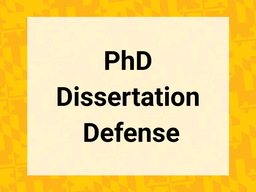Location
Online
PhD Dissertation Defense Announcement: Marilyn Allen – Online Event
Date & Time
June 25, 2021, 9:00 am – 10:00 am
Description
Marilyn Allen, PhD Candidate
Advisors:
Jennie Leach
Associate Professor, Department of Chemical, Biochemical and Environmental Engineering
Greg Szeto
Assistant Investigator, Allen Institute for Immunology
Title:
Nanostructures Encapsulating Antimalarial Drugs for Improved Systemic Lupus Erythematosus Treatment
Abstract:
Systemic lupus erythematosus (SLE) causes damaging inflammation in multiple organs via the accumulation of immune complexes. These complexes activate plasmacytoid DCs (pDCs) via TLR7 and TLR9, contributing to disease pathogenesis by driving secretion of inflammatory type I IFNs. Antimalarial drugs, such as chloroquine (CQ), are TLR antagonists used to alleviate inflammation in SLE. However, they require ~3 months of continuous use before achieving therapeutic efficacy and can accumulate in the retinal pigment epithelium with chronic use resulting in retinopathy. We hypothesized that poly(ethylene glycol)-b-poly(propylene sulfide) (PEG-b-PPS) filamentous nanocarriers, filomicelles (FMs) could improve drug activity and reduce toxicity by directly delivering CQ to pDCs via passive, morphology-based targeting. Healthy human PBMCs were treated with soluble CQ or CQ-loaded FMs, stimulated with TLR agonists or SLE patient sera, and type I IFN secretion was quantified via multi-subtype IFN-α ELISA and MX1 gene expression using real-time RT-qPCR. Our results showed that 50 µg CQ/mg FM decreased MX1 expression and IFN-α production after TLR activation with either synthetic nucleic acid agonists or immune complex rich sera from SLE patients. Cellular uptake and biodistribution studies showed that FMs preferentially accumulate in human pDCs in vitro and in tissues frequently damaged in SLE patients (i.e., liver and kidneys) while sparing the eye in vivo. These results showed that nanocarrier morphology enables drug delivery, and CQ-FMs may be equally effective and more targeted than soluble CQ at inhibiting SLE-relevant pathways.
Agenda:
9:00 AM EST - Presentation followed by questions from the audience.
After the questions from the public, the meeting will be closed for the committee discussion.
WEBEX Information:
Join by phone
+1-202-860-2110 United States Toll (Washington D.C.)
Access code: 120 306 3319
Tags:
